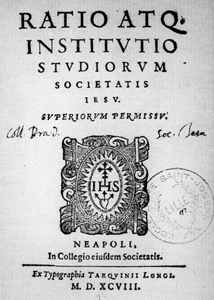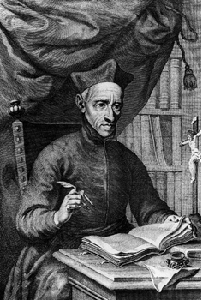Ratio Studiorum: Jesuit Education, 1540-1773
Original Exhibit Fall 1999
This exhibit celebrates the 400th anniversary of the first promulgation
of the Ratio studiorum. It features examples from the extensive Jesuitana collection
in the Burns Library.
 As Jesuit colleges proliferated in the first decades of the Society, questions
about curriculum and administration arose. Furthermore, the need for standardization
of classes and a desire for quality-control were increasingly pressing concerns.
A number of attempts at drawing up such a blueprint were made: first in
1581, then again in 1586. After much discussion among educators in the Society,
a final plan was approved under the guidance of Claudio Acquaviva. The result
was the Ratio studiorum, first published in Naples in 1598 and promulgated
in 1599. As Jesuit colleges proliferated in the first decades of the Society, questions
about curriculum and administration arose. Furthermore, the need for standardization
of classes and a desire for quality-control were increasingly pressing concerns.
A number of attempts at drawing up such a blueprint were made: first in
1581, then again in 1586. After much discussion among educators in the Society,
a final plan was approved under the guidance of Claudio Acquaviva. The result
was the Ratio studiorum, first published in Naples in 1598 and promulgated
in 1599.
|
 Francisco Suarez was born in Granada in 1548. He studied in Salamanca
and joined the Society of Jesus in 1564. Suarez was ordained in 1572; for
the following ten years he successively taught philosophy and theology at
Avila, Segovia, and Valladolid. He then spent five years teaching at the
Roman College until bad health caused him to return to Spain. In 1597 he
received his doctorate at Evora and then took the chair of theology at Coimbra,
where he remained until 1615. His Disputationes metaphysicae (Salamanca,
1597) was the first systematic treatment of metaphysics not based exclusively
on the texts of Aristotle. Suarez was influential not only for his writings
on Aristotle and philosophy, but for his work on scholastic theology as
well; his Commentaria ac disputationes in Primam Partem Divi Thomae (Salamanca,
1595) shows how Suarez brought his erudition to bear on an interpretation
of the theological texts of Aquinas. He died in Lisbon in 1617. Francisco Suarez was born in Granada in 1548. He studied in Salamanca
and joined the Society of Jesus in 1564. Suarez was ordained in 1572; for
the following ten years he successively taught philosophy and theology at
Avila, Segovia, and Valladolid. He then spent five years teaching at the
Roman College until bad health caused him to return to Spain. In 1597 he
received his doctorate at Evora and then took the chair of theology at Coimbra,
where he remained until 1615. His Disputationes metaphysicae (Salamanca,
1597) was the first systematic treatment of metaphysics not based exclusively
on the texts of Aristotle. Suarez was influential not only for his writings
on Aristotle and philosophy, but for his work on scholastic theology as
well; his Commentaria ac disputationes in Primam Partem Divi Thomae (Salamanca,
1595) shows how Suarez brought his erudition to bear on an interpretation
of the theological texts of Aquinas. He died in Lisbon in 1617.
|
For Further Study: Many books relating to Jesuits are
described in The Jesuit Collection in the John J. Burns Library of
Boston College, by John C. Stalker. More items have been added to the
holdings since the publication of Stalker's work; to learn more,
contact a member of the Burns library staff.
« back
 As Jesuit colleges proliferated in the first decades of the Society, questions
about curriculum and administration arose. Furthermore, the need for standardization
of classes and a desire for quality-control were increasingly pressing concerns.
A number of attempts at drawing up such a blueprint were made: first in
1581, then again in 1586. After much discussion among educators in the Society,
a final plan was approved under the guidance of Claudio Acquaviva. The result
was the Ratio studiorum, first published in Naples in 1598 and promulgated
in 1599.
As Jesuit colleges proliferated in the first decades of the Society, questions
about curriculum and administration arose. Furthermore, the need for standardization
of classes and a desire for quality-control were increasingly pressing concerns.
A number of attempts at drawing up such a blueprint were made: first in
1581, then again in 1586. After much discussion among educators in the Society,
a final plan was approved under the guidance of Claudio Acquaviva. The result
was the Ratio studiorum, first published in Naples in 1598 and promulgated
in 1599. Francisco Suarez was born in Granada in 1548. He studied in Salamanca
and joined the Society of Jesus in 1564. Suarez was ordained in 1572; for
the following ten years he successively taught philosophy and theology at
Avila, Segovia, and Valladolid. He then spent five years teaching at the
Roman College until bad health caused him to return to Spain. In 1597 he
received his doctorate at Evora and then took the chair of theology at Coimbra,
where he remained until 1615. His Disputationes metaphysicae (Salamanca,
1597) was the first systematic treatment of metaphysics not based exclusively
on the texts of Aristotle. Suarez was influential not only for his writings
on Aristotle and philosophy, but for his work on scholastic theology as
well; his Commentaria ac disputationes in Primam Partem Divi Thomae (Salamanca,
1595) shows how Suarez brought his erudition to bear on an interpretation
of the theological texts of Aquinas. He died in Lisbon in 1617.
Francisco Suarez was born in Granada in 1548. He studied in Salamanca
and joined the Society of Jesus in 1564. Suarez was ordained in 1572; for
the following ten years he successively taught philosophy and theology at
Avila, Segovia, and Valladolid. He then spent five years teaching at the
Roman College until bad health caused him to return to Spain. In 1597 he
received his doctorate at Evora and then took the chair of theology at Coimbra,
where he remained until 1615. His Disputationes metaphysicae (Salamanca,
1597) was the first systematic treatment of metaphysics not based exclusively
on the texts of Aristotle. Suarez was influential not only for his writings
on Aristotle and philosophy, but for his work on scholastic theology as
well; his Commentaria ac disputationes in Primam Partem Divi Thomae (Salamanca,
1595) shows how Suarez brought his erudition to bear on an interpretation
of the theological texts of Aquinas. He died in Lisbon in 1617.